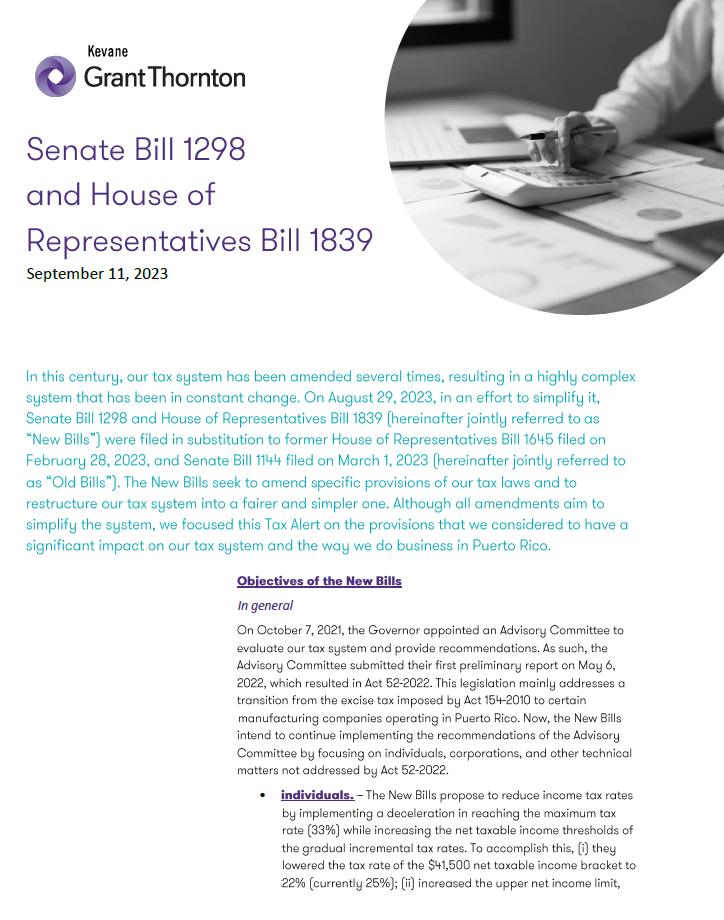| Section or Article |
Summary of the Amendment
|
1010.01
Definitions
|
The LLC definition is revised to incorporate that if a foreign entity is not classified as a corporation, partnership, or trust, it will be categorized as an LLC. Moreover, for taxable years after December 31, 2022, single member LLCs may elect to be taxed as disregarded entities, even if the member is not a resident individual of Puerto Rico.
|
1021.01
Regular tax on individuals
|
For taxable years beginning on January 1, 2023, the regular tax rates for individuals are as follows:
|
$9,000 or less
|
0%
|
|
$9,001 to $25,000
|
7%
|
|
$25,001 to $41,500
|
$1,120 + 14% of the excess over $25,000
|
|
$41,501 to $81,500
|
$3,430 + 22% of the excess over $41,500
|
|
$81,500 to $300,000
|
$12,230 + 30% of the excess over $81,500
|
|
$300,000 or more
|
$77,780 + 33% of the excess over $300,000
|
|
1021.02
Alternative minimum tax on individuals
1022.04
Determining alternative minimum net income
|
Eliminates the requirement for accrual or fiscal year-end taxpayers to include with the income tax return a book to informative return expense reconciliation to claim certain deductions reported in informative returns against their alternate minimum net income. However, they are obligated to retain in their records such reconciliations.
|
1022.01
Regular tax on corporations
|
For taxable years beginning after December 31, 2022, the regular tax on corporations (currently 18.5%) is amended to set progressive rates beginning at 17% (for net taxable income not exceeding $275,000) and maxing out at 33% (for net taxable income exceeding $3,000,000).
|
1022.02
Surtax on corporations
|
For taxable years beginning after December 31, 2022, the surtax is eliminated.
|
1022.03
Alternative minimum tax on corporations
|
For taxable years beginning after December 31, 2022, the corporations’ tentative minimum tax of $500 is eliminated.
|
1022.07
Optional tax for corporations rendering services
|
For taxable years beginning after December 31, 2021, corporations whose gross income substantially comes from services may opt for the optional tax and may pay the tax with the income tax return, excluding extensions.
|
1031.02
Exemptions from gross income
|
For taxable years beginning after December 31, 2023, the first $40,000 earned by a Puerto Rico resident who is admitted to practice medicine in Puerto Rico and other medical-related professions (podiatry, audiology, chiropractic, optometry, or dentistry) on a full-time basis are exempt from taxation. This exemption can be availed once in a lifetime for a continuous period of 5 years. This exemption is not available to an individual who has availed benefits under Act 14-2017, or Act 135-2014 or Act 60-2019 for young entrepreneurs.
For taxable years beginning after December 31, 2023, interests and dividends received by an individual resident of Puerto Rico will be exempt from income tax, as well as net capital gains realized in connection with the appreciation of securities and other assets as defined under Sections 1020.01 and 1020.02 of Act 60-2019 within the period after becoming a resident of Puerto Rico.
|
1033.15
Deductions applicable to individual taxpayers
1033.18
Allowance for personal and dependents exemption
|
For taxable years beginning after December 31, 2023, the maximum amount allowed for certain deductions for individuals and personal and dependent exemptions, increases due to the new cost-of-living allowance.
|
1040.02
Rule for accounting methods
|
For taxable years beginning after December 31, 2022, increases the average annual gross income threshold allowed to use the cash basis method of accounting from an average annual gross income of $3,000,000 to $10,000,000 and can be adopted without seeking approval from the Secretary of Treasury.
|
1061.03
Partnerships returns
|
Moves the filing due date for the entity’s informative annual return to the last day of the third month following the close of year (March 31 for calendar year taxpayers).
|
1061.16
Time and place for filing returns
1061.17
Payment of tax
|
Authorizes the Secretary of Treasury to move the due date of returns, declarations or income tax payments in extraordinary situations or during emergency declarations, but the extension cannot exceed 6 months from the original filing or payment date.
|
1061.25
Foreign financial accounts
|
Modifies the requirements for individuals who must report foreign financial accounts, stating that a filing requirement applies if the aggregate value of financial accounts outside of Puerto Rico and the United States reaches $10,000 (currently, the $10,000 threshold exception is considered per account).
Excluded accounts will include those where the owner is a business entity in which the individual has a controlling interest (50% or more) or where the individual has authority to control the disposition of the assets.
|
1063.15
Information return on
transactions made by electronic means.
|
It broadens the range of transactions that must be reported annually by businesses that provide payment processing options. This expansion is achieved by revising the definition and scope of a “participating merchant” to include those who accept payments through mobile applications, in addition to the traditional means like debit and credit cards already included in the section. Furthermore, this term also includes anyone who conducts any form of commercial activity.
|
3020.09
Vessels and heavy equipment
|
An excise tax of 7% will be levied, collected and paid on all types of vessels and heavy equipment introduced from abroad or manufactured in Puerto Rico (previously, the maximum excise tax per vessel was limited to $10,000). In addition, beginning on June 30, 2024, it eliminates the $10,000 excise tax threshold on vessels introduced from abroad or manufactured in Puerto Rico.
|
4010.01
General definitions
|
The definition of designated professional services is amended to specify that for purposes of determining if the volume of business does not exceed the $200,000 threshold for exemption from collecting the sales and use tax on services rendered, the volume of business to be used is the amount reported on the sales and use tax monthly return for the immediately preceding calendar year and/or the income tax return filed.
The definition of taxable services is amended to include the term “related person” on the exemption provided for services rendered by a person engaged in trade or business in Puerto Rico to another person engaged in trade or business in Puerto Rico and that forms part of a controlled group of corporations or group of related entities.
Adds a new term “Tickets Seller Company”, defined as a company dedicated to the sale of tickets for public shows, hired by the establishment where the public show is to be held, and maybe the facility itself.
|
4020.05
Collection of the tax
|
Starting January 1, 2025, a duly registered merchant may request a document to be relieved of the requirement to collect, withhold and deposit the sales and use tax on sales of taxable items to a reseller merchant.
|
4020.07
Collection of sales tax on sales for resale, or on sales to an eligible reseller
|
Starting January 2025, a duly registered merchant shall be relieved from the requirement of collecting, withholding and depositing the sales and use tax on sales of taxable items purchased exclusively for resale to reseller merchants who have a Certificate of Exemption.
|
4030.02
Exemption certificate and eligible reseller certificate
|
Beginning on January 1, 2025, every reseller merchant may request and obtain a Certificate of Exemption that allows the merchant to be exempt from the sales and use tax regarding the purchase of taxable items for resale or export, and the Secretary will stop issuing the Eligible Reseller Certificate.
|
4042.03
Time to remit the sales and use tax
|
Changes the title of the section and eliminates the rules for bonded merchants beginning on January 1, 2025.
|
4050.04
Credit for taxes paid by a reseller
|
Beginning on January 1, 2025, the Certificate of Reseller will no longer be required.
|
6041.10
Failure of corporations or partnerships to pay the estimated tax
|
For taxable years beginning after December 31, 2021, entities with a Decree of Tax Exemption under Act 135-1997, Act 73-2008 or Act 60-2019, will be required to pay estimated income taxes.
|
6051.21
Additional Powers of the Secretary over the administration of this Code
|
Modifies the faculties of the Secretary of Treasury in connection to the Voluntary Disclosure Program and the Taxpayer Rehabilitation Programs by allowing the Secretary to condone charges and penalties and approve payment plans lower than 6 months under both programs. It also eliminates the Secretary’s discretion to grant a lower tax rate between the one currently in place and the one applicable to the tax periods under the Voluntary Disclosure Program.
|
6080.14
Municipal levy of sales and use tax
|
Effective on July 1, 2023, municipalities may voluntarily reach an agreement with the Secretary to use the digital platform SURI to administer and file the municipal sales and use tax returns. However, we understand that the effectiveness date could change. The Treasury Department is currently working on a pilot program with some municipalities.
|






